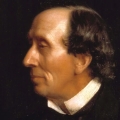
The rags - Hans Christian Andersen
The rags
A fairy tale by Hans Christian Andersen
Outside the paper mill, masses of rags lay piled in high stacks; they had been gathered from far and wide. Every rag had a tale to tell, and told it, too; but we can't listen to all of them. Some of the rags were native; others came from foreign countries.
Now here lay a Danish rag beside a rag from Norway; one was decidedly Danish, the other decidedly Norse, and that was the amusing part about the two, as any good Dane or Norwegian could tell you. They could understand each other well enough, though the two languages were as different, according to the Norwegian, as French and Hebrew. "We go to the hills for our language, and there get it pure and firsthand, while the Dane cooks up some sort of a suckling-sweet lingo!"
So the rags talked - and a rag is a rag in every land the world over; they are considered of no value except in the rag heap.
"I am Norse!" said the Norwegian. "And when I've said I'm Norse I guess I've said enough. I'm firm of fiber, like the ancient granite rocks of old Norway. The land up there has a constitution, like the free United States. It makes my fibers tingle to think what I am and to sound out my thoughts in words of granite!"
"But we have literature," said the Danish rag. "Do you understand what that is?"
"Understand?" repeated the Norwegian. "Lowland creature! Shall I give him a shove uphill and show him a northern light, rag that he is? When the sun of Norway has thawed the ice, then Danish fruit barges come up to us with butter and cheese - an eatable cargo, I grant you - but by way of ballast they bring Danish literature, too! We don't need the stuff. You don't need stale beer where fresh springs spout, and up there is a natural well that has never been tapped or been made known to Europeans by the cackling of newspapers, jobbers, and traveling authors in foreign countries. I speak freely from the bottom of my lungs, and the Dane must get used to a free voice. And so he will someday, when as a fellow Scandinavian he wants to cling to our proud mountain country, the summit of the world!"
"Now a Danish rag could never talk like that - never!" said the Dane. "It's not in our nature. I know myself, and all the other rags are like me. We're too good-natured, too unassuming; we think too little of ourselves. Not that we gain much by our modesty, but I like it; I think it's quite charming. Incidentally, I'm perfectly aware of my own good values, I assure you, but I don't talk about them; nobody can ever accuse me of that. I'm soft and easy going; bear everything patiently, envy nobody, and speak good of everybody - though there isn't much good to be said of most other people, but that's their business. I can afford to smile at them; I know I'm so gifted."
"Don't speak to me in that lowland, pasteboard language - it makes me sick!" said the Norwegian, as he caught a puff of wind and fluttered away from his own heap to another.
They both became paper; and, as it turned out, the Norwegian rag became a sheet on which a Norwegian wrote a love letter to a Danish girl, while the Danish rag became the manuscript for a Danish poem praising Norway's beauty and strength.
So something good may come even of rags when they have once come out of the rag heap and the change has been made into truth and beauty; they keep up understanding relations between us, and in that there is a blessing.
That is the story. It's rather amusing and offends no one - but the rags.
* * * * *
Fairy taleHans Christian Andersen
Compare two languages:


















